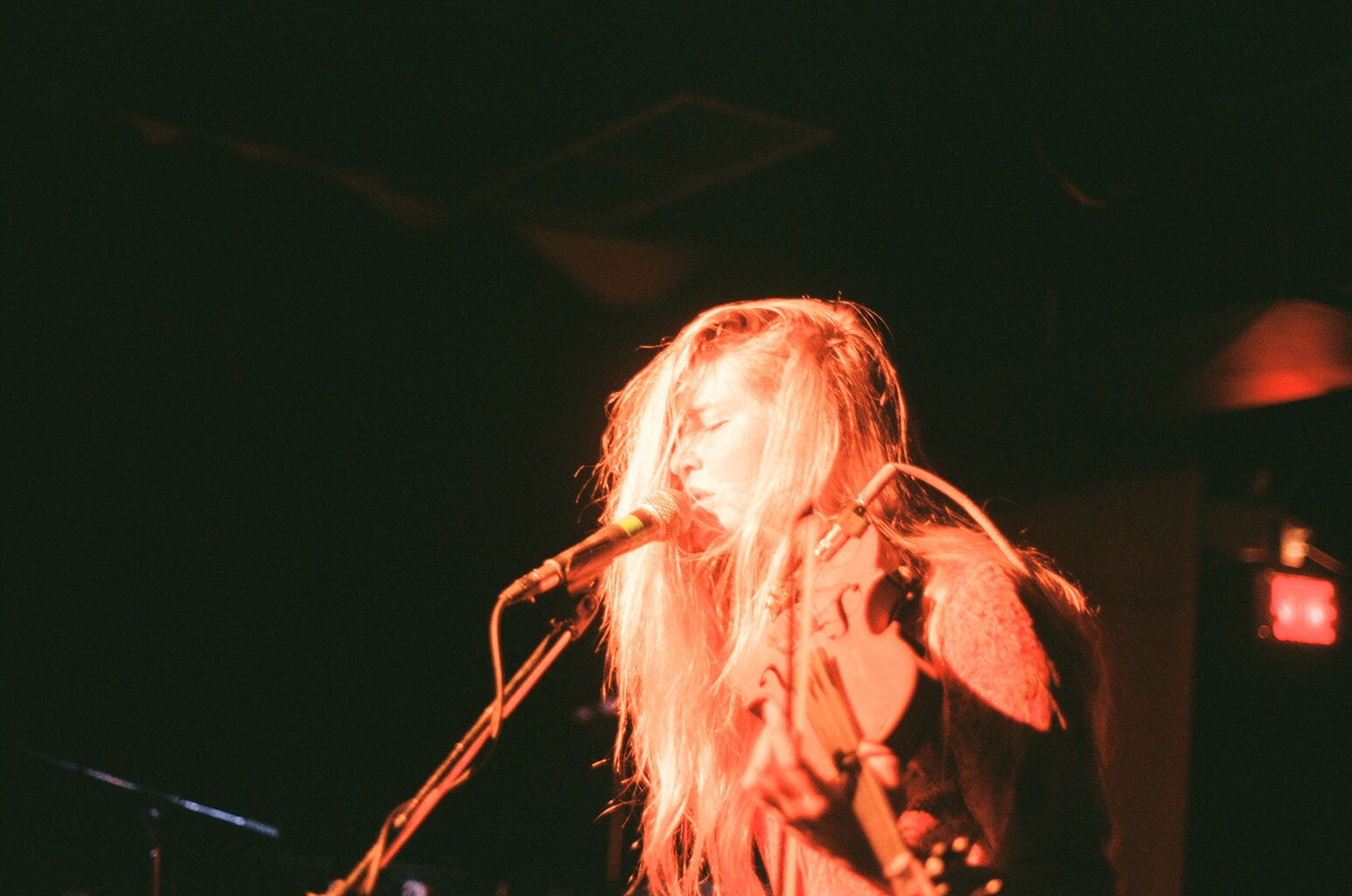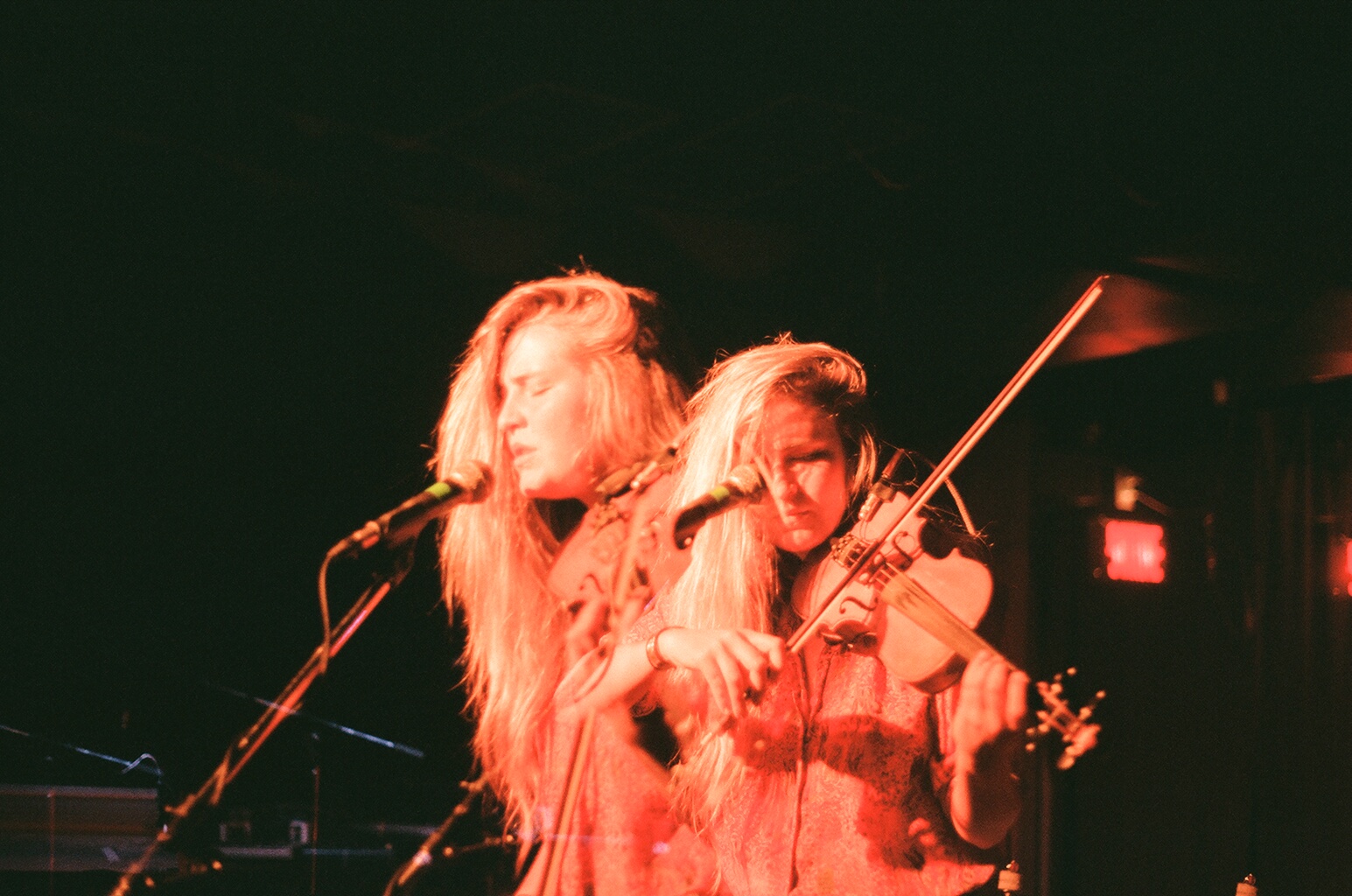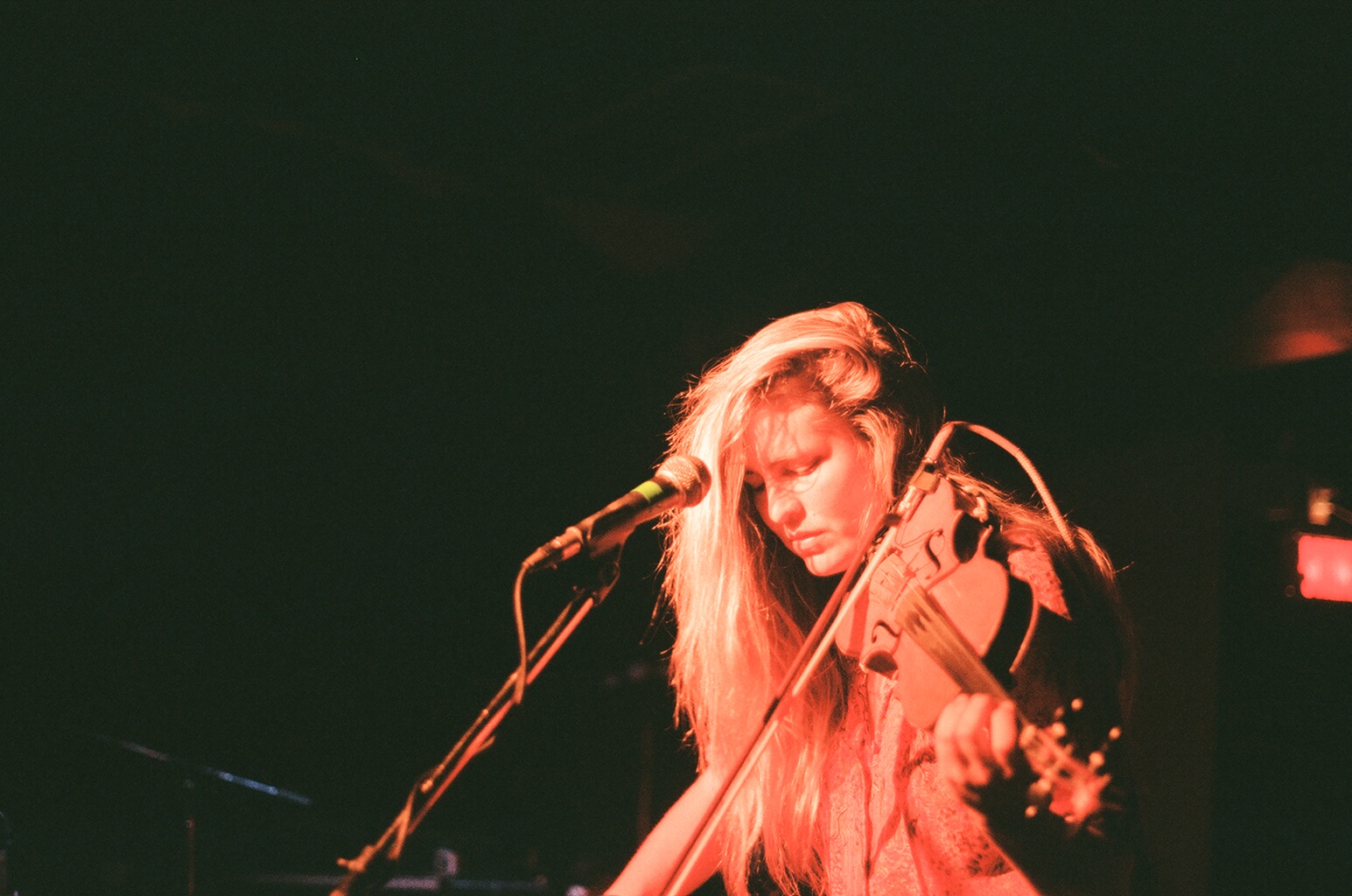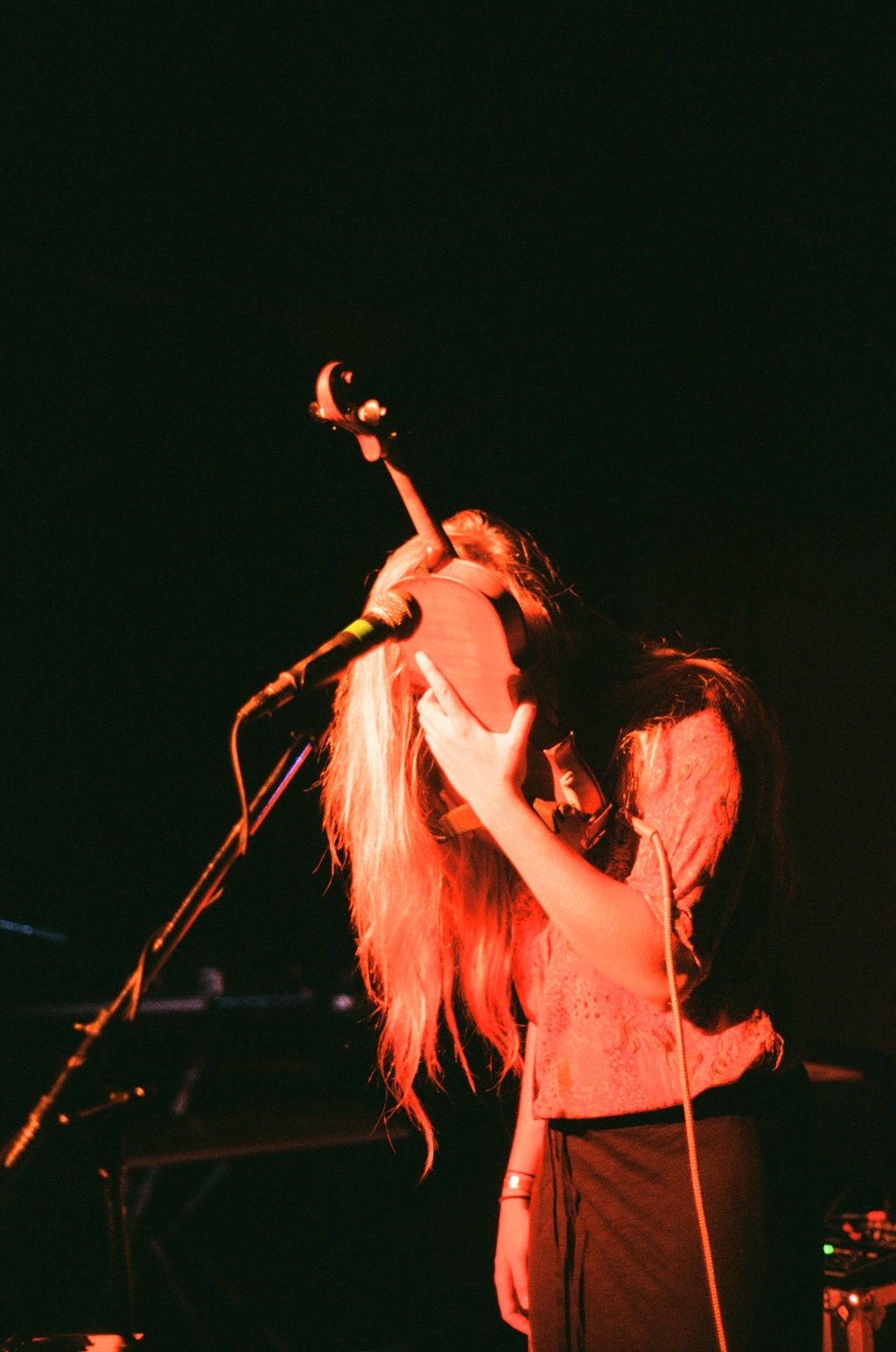
Hannah Epperson
Brimming
In Interviews • # Hannah Epperson, Montreal, music
Hannah Epperson is a Utah born, Vancouver raised, New York based musician and singer-songwriter. Her music is its own genre, a unique style that’s hard to put into words. She uses her voice, violin, loop pedals, and fellow musicians in unexpected and beautiful ways, creating something utterly powerful—you don’t really just listen to her music, you feel it. One of our editors was lucky enough to see Hannah live in Montreal in early May, and caught up with her for a walk up Mount Royal and around the Plateau.
Ok—you were just saying how you’re a very critical person?
It doesn’t matter what comes in my direction, I will… Ok listen. I have a problem, this is why I think I’m sort of a crisis dependent person, because if I’m not having to react to something immediately, then I have time to criticize it, and once I start criticizing it, I cannot accomplish anything. This is how it was all through university, with academics, with all of my papers, I literally wrote every single paper in a state of complete panic and I would not edit, I would not re-read my essays, because once I re-read them I would completely destroy them.
It’s the same thing with music, I never practice, ever. The tour that I just did in Europe, I was working on a composition with this dance company the two weeks leading up to it, I got to Berlin for my first show, I was unpacking my gear, and I was like, Oh, I don’t actually know how to play my new arrangements, I’m going to have to figure it out tonight while I’m playing. So I was supposed to play a forty-minute set—I played for an hour and twenty minutes, because I would just keep improvising while I was trying to figure out how I was going to continue and conclude every song.
Do you improvise a lot at your shows?
For every song there’s a skeletal structure. Every musician is different in their approach to performance, and their reasons and their motives are different, and I value and respect them all. For me, I am so environmentally affected that I like to allow for space. It’s important for me to expand into this space of every different room that I walk into, it’s like, the energy of the people in the room, the acoustics of the architectural space that I’m in, the lighting, the conversation I had with the sound engineer before the show, how the food made me feel—all of these things affect the way that I experience the sort of unfolding that happens during a show.
I’m not sure that I want to be a musician… I wake up and wrestle with it, every day—how is it possible for this to be the right thing?
This is part of why I think that I’m so demanding of my audience, it’s like, I’m here, doing this with you, I can’t do this without you guys. I love that state of dependency, it makes me feel so present, and that’s why I do it, that feeling of presence and connection with other people. That’s what music is for, you know, it’s spatial, music moves through space and passes through your body, and makes crazy vibrations in the water content of your body. For me, that reactionary, improvisational, fleshy space around the skeleton is super important. Really really important.
When you say it’s like a skeleton, do you mean an actual skeleton, like a body?
Everything is connected, I definitely feel like I’m pretty attached to the material world, it’s the only place where you can agree upon a mutual reality. Everyone has their own super dense complicated internal reality, and that’s why we develop music, and language, because then we can find ways to negotiate those really complicated realities. The material world is like… That is unnegotiable—that tree right there—and so there’s this quality of sound that I really love, it moves through space, sound waves move through space and affect the body. I studied human geography in university, and it’s a very interdisciplinary discipline, it’s always about the connection between people and places and things, and for me the relationship between sound and space and architecture is very intriguing, it’s very compelling.
Do you see music as a sort of emotional communication?
It’s really interesting to me, a lot of African music is super polyrhythmic, very very very complicated, and I think it comes from a different experience, a cultural experience of space, like people playing music in a circle. In Western society we have the stage and the audience, it’s very linear, our time signatures are 4/4, there’s so much more organization. There’s this grid-like quality to a lot of Western music that echoes the grid-like quality of our transit systems.
Is that rigidness a bad thing?
No, I don’t think it’s a bad thing, I think it’s just one set of rules to play in. Creativity cannot exist without rules to break, that’s what creativity is, having a rule and figuring out how to break it. That’s why I think the most creative people take responsibility for setting really really really fucking cool parameters, and then they expand fully into those parameters. Yeah, knowing rules and breaking them, that’s pretty crucial in this life I think.

Your online presence and the way you use social media is super different from other bands and musicians, it’s so much warmer and more genuine and human, is that intentional?
I think perhaps one of the reasons why my social media presence might be different from a lot of other bands is that I never made a distinct decision or move to be Hannah Epperson The Musician. My identity as a musician is one hundred percent conflated with just who I am. It’s all there, it’s only Hannah Epperson, and I feel like, for me, ‘as a musician,’ my responsibility is to reflect and synthesize the issues that I am observing and participating in. I don’t know what the fuck the point of being a musician is otherwise, it’s just indulgence otherwise. It doesn’t have to be explicit lyrics about like, Oh I’m really pissed off about the government selling this area to an oil company, that sucks, it doesn’t have to be lyrics but there’s a responsibility to participate, to emote.
Music comes from all of the things that we’ve experienced in this life, and so you have to experience as much and with as much intention as possible, that’s how you make good music.
I’m getting a little bit ahead of myself here—I guess I just feel like, I’m not sure that I want to be a musician. It’s something that I will always have in my life, but as a profession, I wake up and wrestle with it, every day, because there’s so much shit going on in the world, and how is this—how is it possible for this to be the right thing? Some days I feel very confident about doing music, and about the conversations that I’m able to have with people day after day. Other days it just feels so fucked.
So ‘your music’ and ‘your life’ are pretty much the same thing.
The same thing. I think maybe what it is is that music and composition is the most refined tool that I have in my toolkit to process everything that’s going on around me, it’s just my best tool. Everyone has different tools, some people are really good at growing plants, some people are really good at writing political speeches, some people are really good at breastfeeding, whatever, there are so many good, important tools. Music is one that is pretty readily available to me, which is a really huge privilege and also a responsibility, I think, and so for me the most important thing as a musician, for my music, is doing everything else, everything else that isn’t music, being engaged in politics and in my community.
What makes that the most important thing?
I feel like when I play music or write music I’m not doing it in a calculated way, at all, it’s something that just… it’s a sensation, I feel like a lot of artists explain this, you kind of feel like there’s something that’s passing through, it’s beyond me somehow. The synaptic network in your brain is so complicated, it’s fucked, and music is this really engaging synaptic cacophony, and when you’re in the process of making music, there’s so much synaptic firing going on. You can’t even begin to comprehend how it’s all happening, but all of those firings come from everything, everything that you take in—the kid that you saw running through the forest, or the small memory of a chapter that your dad read out loud to you when you were twelve and vomiting, or whatever—music just comes from all of the things that we’ve experienced in this life, and so you have to experience as much and with as much intention as possible, that’s how you make good music! Also I mean… discipline, you know, practicing.
Yeah we can’t really do anything properly in isolation, because then it isn’t informed by anything.
No, it doesn’t mean anything. It lacks substance, and what the fuck is the point of this life—I don’t know. I don’t know! But it’s crazy to be alive! It’s really crazy, and I want to do it really well, because it’s miraculous. It’s miraculous! Anyway. That sort of got out of control. Coffee really punched me in the face I think.
A while ago we interviewed a Canadian philosopher, Jan Zwicky, and you remind me a lot of her. You seem really interested in and in tune with how things are all connected, you have a sort of ‘big picture’ attitude, which is really cool. I am by no means qualified to explain her philosophy, but what our conversation is reminding me of is her talking about gestalts, these wholes that are more than the sum of their parts, and gestalt shifts, where people suddenly briefly perceive this larger whole around them—the big picture. This idea made me believe in ghosts actually, thinking of them as a kind of big picture that some people are able to see and others aren’t. I don’t really know where I thought I was going here… does any of that resonate with you?
That’s a really beautiful way of understanding ghosts. That’s really wonderful. I mean this makes me want to launch into a discussion about religion… I never really thought about it when I was growing up which is hilarious because I was born in Utah and my parents were Mormon. My family was Mormon, and they were excommunicated from the church when I was quite young. Part of it was kind of my fault because I asked my parents when I would get the priesthood, like my three big brothers, and they were just like like, Uhh, well, we’re not going to answer that question, we’re just going to take you out of here, because this is wrong! So that was a huge thing, as I get older, starting to understand the dimensions of losing a faith.
You can find a way to relate to anybody in this world, if you just give them some fucking time.
For my father I think it was unbearable, so difficult and humiliating, to have brought his whole family to the Mormon church and then be like, Actually, no. He did his PhD in religion and he was a theology and religious history professor, and he’s one of these people who’s like, Read everything, just read everything, read baseball stats and read religious philosophy and read really good children’s books, because all of these stories are what we use to make meaning of this vast chaos. My dad just has this ability to talk—he has this sort of religious fluency—he can talk to anybody from any religion and he just gets it, because he’s able to engage on a deeper level. We have these words that people don’t really investigate that much or have a really shallow understanding of, especially when it comes to religion. People close off because they hear a word, and that word can actually mean tremendously more, and so when you were talking about the way you understand ghosts for example, it’s like Yes, that I agree with, you’re just using a different word. I feel like some of the most intelligent people I know are people who are wrestling with religion, because religion is basically just a system that we try to create to order morality and live in a moralistic, deep, appreciative way. I get really pissed off when people just shut down in discussions about religion. I get really bored by a lot of atheists and agnostic people because they’re just not bothering to spend time with the unanswerable questions. The unanswerable ones are the most important!
Is your music spiritual for you?
Again, the word ‘spiritual’ is weird because it’s used in so many weird contexts now, but yeah, for sure. I am a deeply emotional person, I feel things so, so enormously, I can’t contain it, that’s why I do music—I’m brimming! I need some receptacle for this! It’s too much, and I think I have to say I am so, so lucky that I grew up in the family that I did because I am an idealist, my parents are so loving and gracious and real, they’re so real. Talking about my parents makes me want to cry because they’re just the best humans, and I’m really fucking lucky because they created an environment where I felt safe to feel everything, you know? And share it and express it and feel safe.
Yeah parents are pretty fucking rad.
One of my brothers got kind of sucked into the mental health system, to his great, great detriment, and my mom just did everything, and took it farther, she’s working on lobbying to redraft mental health rights because the mental health system is so fucked in Canada. Like that’s how extreme my parents are, my mom’s getting involved at the provincial and federal level now, because she takes it seriously, and then you start to see how many other people are getting fucked over and who don’t have advocates.
So much of what my music is is just frustration with a society that was inhospitable to one of the best people I ever knew, and Nick’s not here anymore. And he’s the best, he’s the best human, so fucking sensitive and talented and kind and gentle, the most selfless person, and he just got fucked over, he’s just too… Our society is not kind to people that deviate from what we’re supposed to be, people who are truly altruistic get totally, totally fucked. I feel like Nick taught me everything that I know about music, every piece of music that I listened to until I was 16 was Nick playing it for me, he was a gorgeous cellist. Fuck we lost a really good one. And I have a responsibility now to have as many conversations and create as many spaces for people to feel safe and connected as possible. Like I have to. Because Nick’s not here anymore. I mean there’s that, and also I just care about… Ahh, that got really heavy really fast!
Wow, thank you for talking to me about this. It sounds like you’re doing something so positive and valuable with it, something that will really make a difference for people, which is beautiful.
I hope so. I really hope so.

What’s your favourite show that you’ve played, or space or place that you’ve played in?
I had a show in Dawson City, the Dawson City Music Festival, a couple of summers ago, anyway this place called the Palace Grand, it’s this old old building that had burnt down and they rebuilt it stitch for stitch basically. Dawson City’s pretty magical. Something about that show, it was kind of like the first time that I was like, I’m a musician, I’m getting paid well to play a festival and I got flown up here and I’m doing it.
The venue was unbelievably beautiful, and it was packed, it was one of the most visceral… usually when I play my eyes are closed, and I experience these really wild landscapes, like I’m just moving through landscapes, and this one was a particularly cool journey, and I remember after I went off the stage and I felt like I was puke crying, I just wept. It felt so good, I just cried because I felt a lot, it wasn’t like bad or good it was just like Wooaaahhh, I’m alive! Gah, that’s crazy! So that was helpful. I had a lot of good shows on this last European tour too.
I mean last night was really awesome, that was my fourth show with Steven Foster and we finally clicked. He’s a great friend of mine, I think we’ve just mutually respected each other as musicians for a super long time. Royal Canoe asked me to do these shows, and I was looking at the venues and was like, I need something a little bit more—Steven Foster, what’s your schedule like? And he was like, Oh I’m getting back from a two month tour the day before, and so we just finagled our way into a jam space at like 9:30pm the night before we started the tour, jammed for three hours, and then we started playing together. That was six days ago, so last night was like, Ohh sweet we finally get it, together, and it sucks because now I’m going to go do a month-long tour without him, and it’s going to feel so vacant.
Wait—you hadn’t played with him before this week?!
I’ve never played with Steven Foster before. I wouldn’t trust that many musicians, there aren’t that many musicians I would ask to do that, but I just knew he could do it, I was like, Steven the thing is you’ve got it, you’re going to be fine, you’re going to be great actually. And so last night it finally clicked, and my voice was so fucked but it was kinda fun, you know I was talking earlier about parameters, I felt like, Ok I have like three notes to work with, this is cool, I’m going to find a new way to use my voice now, and I kind of enjoyed it.
Amazing. What are some of your favourite bands or musicians right now, or some of your influences?
I listened to Bjork and Radiohead religiously growing up. I don’t listen to that much music, that’s what’s crazy, like I never look for music, and I also have just had the good fortune of being surrounded by good musicians, especially in New York. Some of my favourite bands right now are my friends’ bands, which is weird because I’m usually like the most critical. This band Big Thief, Steve’s project Omhouse, Royal Canoe, Aidan Knight, all of these guys.
And you were saying before that your musical influences aren’t really other musicians, they’re the people and things in your life, right?
That’s the thing, a big reason why I moved to New York is that I’m doing a lot of really immersive theatre, doing composition for dance, music composition, yeah. I just directed my first music video, two days before I came to Toronto, and it was the best. I was just like, I get how it all is supposed to be, this is the best. So that was fucking awesome, and my best friend in New York is a choreographer and I’ve done a couple of evening-length compositions for her company, and I love it. It’s so incredible when there are two languages, the language of music, the language of gesture, and they’re different languages and you just meet and explode in the place in between and around, it’s just the best, I love it.
Last night you introduced your song “Farthest Distance” as a fuck-you to hashtag culture… want to expand on that?
Yeah, yeah, well I wrote it the week that the Charlie Hebdo incident happened, and I was so freaking frustrated, because everybody… This really complicated event happened, a lot of layers of things going on when that happened, and within like a few hours there are people on the other side of the world just kind of throwing out the Je Suis Charlie hashtag, and it’s like, Do you even know… have you ever even heard of the Charlie Hebdo world at all? Do you even know what you’re saying? For the most part, no! So many people who are using this hashtag are just like it’s the hip thing to do and you’re showing your solidarity with something, committing yourself to this movement that you haven’t even given time to talk about or think about critically. I find that so destructive, I think it eliminates the space and time that’s needed to have conversations and dialogue. It’s really reductive, it’s impatient. I mean hashtags are really helpful for categorizing things, like shows in Montreal, #showsinmontreal, it’s great, it’s like an indexing tool, that’s not what I’m talking about, I’m not talking about the indexing capacity of hashtags.
Mostly, I’m feeling really sad with how impatient people are—life is so complicated, there are so many realities, and all of them are right in some way. You can find a way to relate to anybody in this world, if you just give them some fucking time. So that’s where the fuck-you comes in. That’s what I would say about that. I was also reading The Waste Land, by T. S. Eliot, at that same time, and so there’s definitely a certain kind of lyrical aesthetic that is derivative of that, sections of the poem. I was like this is so connected, like there’s that line “I can’t even find silence in the waste land,” you bring that into the context of social media and the cacophony of the pixelated world and it’s like—
Sshhhhh, please stop talking everybody! Just go!
Let there be some silence for a little while!

~
~